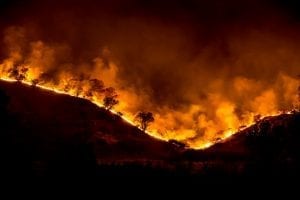While you can’t stop a disaster from happening, you can prepare for it.
Every year, nearly 200 million people are impacted by natural disasters, another 99,000 are killed, and over $162 billion a year is spent on the emergency situations they create – a staggering impact that is just the beginning of the far reach of natural disasters. Serious injury, displacement, loss of family, and even the effects PTSD are just a few of the traumatizing results that can be felt long after the disaster itself.
Even though every state in the Union has risks of natural disasters, only about half of American adults are prepared. Many don’t have a plan or even have enough food or water to get the family through a few days. And when utilities get shut down and grocery store shelves are empty, they’re left with little to do but panic.
While you can’t stop a disaster from happening, you can prepare for it. Because in dire situations when first responders may not be able to reach you, being prepared keeps you from needing emergency help while allowing responders to handle the cases that do. Staying prepared also reduces the impact of an emergency on your life and makes you more capable of dealing with the chaos of the unknown – not to mention potentially avoiding danger altogether.

This guide walks you through how to prepare for a natural disaster, how to act if one occurs, and what actions to take once it ends – because disasters happen quickly, which means you must be prepared to act quickly.
Why Disaster Preparedness is Important
Why prepare for disaster? There are many reasons to prepare for an emergency, but these are some of the most important:
- Immediately after an emergency, services and utilities may be cut off. If you’re not prepared, you may not have access to water, refrigeration, or communication to stay updated on the situation.
- Emergency responders may not be able to reach you, which means you may need to fend for yourself from a few hours to a few days.
- Even if you can get out during or after an emergency, it may be hard to get things you need. Grocery stores sell out, and once those shelves are empty, it can be awhile before they get restocked.
- With some emergency situations, you have time. You may have two to three days to prepare before a hurricane hits, but if you’re involved in a terrorist attack or flash flood, there’s not much time to get things in order.
- Depending on the situation, things may be dangerous right after a disaster. Small earthquakes could hit at any time or there may be people looting on the streets. Try to stay inside to avoid danger.
- If you or a family member have a disability or special needs, it’s even more important to stay prepared. Without preparation, you may not have the items you need to maintain health.
- While the rate of natural disasters typically remains stable, the amount of climate-related disasters is increasing. And with a growing number of people living in and working around danger zones – such as floodplains and high-risk earthquakes zones – the risk of being a victim in a disaster is more likely.
- More than anything, a natural disaster can happen to you. Nine in 10 Americans say they have either been in a disaster or have been impacted by one.
Now that you know why you need to be prepared, click here to read the rest of the article at Ammo.com to learn how to do it.


Join the conversation!